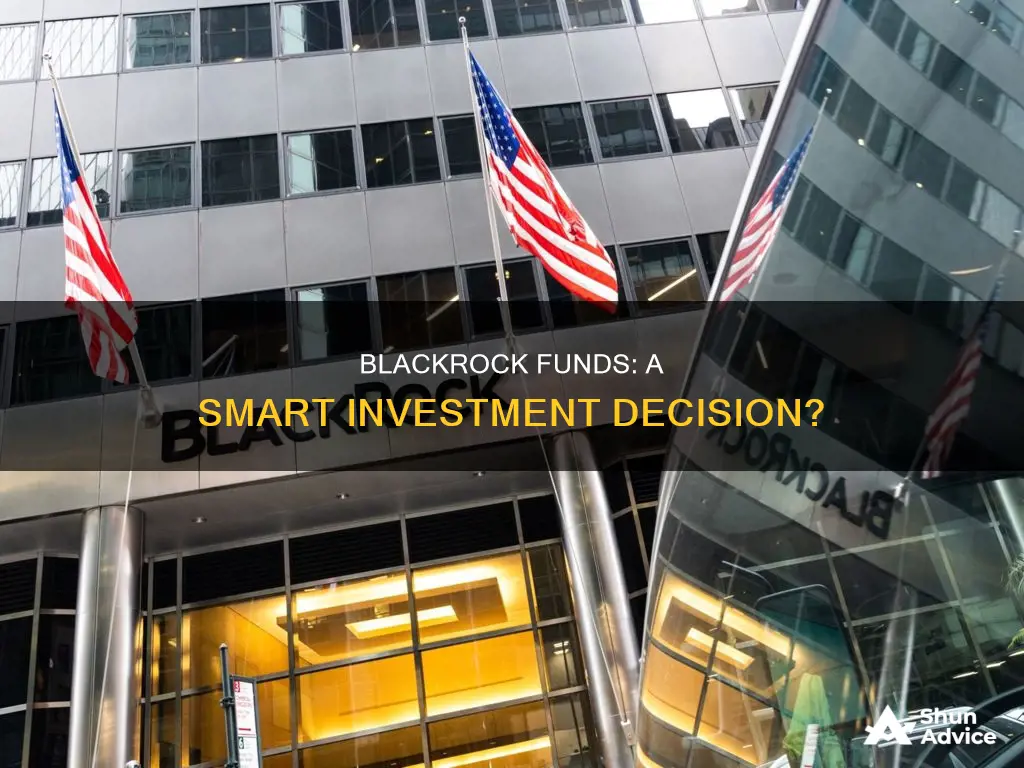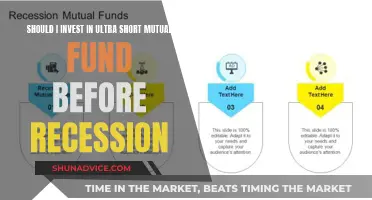
Investing in BlackRock funds can be a great way to improve your financial well-being. With $10.5 trillion in assets under management and a market cap of $120 billion, BlackRock is the world's largest asset manager. They offer a wide range of investment products, including mutual funds and exchange-traded funds (ETFs), that cater to diverse investment goals and preferences. Before investing, it's important to define your investment goals, understand your risk tolerance, and consider factors such as time horizon, investment amount, and desired returns. BlackRock provides resources and tools to help investors make informed decisions, but it's recommended to consult a qualified financial advisor for personalized advice.
What You'll Learn

What are the benefits of investing in BlackRock funds?
Investing in BlackRock funds can be a great way to improve your financial well-being. Here are some of the key benefits:
Diversification
BlackRock offers a diverse range of investment options, including stocks, bonds, mutual funds, exchange-traded funds (ETFs), and alternative investments such as real estate. This allows investors to diversify their portfolios and reduce risk.
Risk Management
BlackRock emphasizes risk management in its investment approach. Their funds aim to provide consistent, long-term performance with a focus on sustainability. This means that investors can feel confident that their investments are managed with a focus on preserving capital and generating steady returns.
Wide Range of Investment Options
BlackRock has an extensive selection of investment products, including hundreds of mutual funds and ETFs. This gives investors the flexibility to choose funds that align with their investment goals, risk tolerance, and time horizon.
Financial Technology
BlackRock was a pioneer in using financial technology (fintech) to enhance the performance of its funds and improve client satisfaction. Their use of state-of-the-art technology ensures that investors have access to the latest tools and resources when making investment decisions.
Retirement Planning
Many BlackRock funds are well-suited for retirement savings. The company offers a range of investment options, including equity funds, bond funds, and balanced funds, that can help individuals save for retirement and achieve their financial goals.
Global Presence and Expertise
As the world's largest asset manager, BlackRock has a global presence and expertise in various financial markets. This allows them to provide investors with access to international investment opportunities, such as emerging markets, and a diverse range of infrastructure and sector expertise.
Support and Resources
BlackRock provides extensive support and resources to financial professionals, including model portfolios, investment tools, and educational content. This helps advisors make more informed decisions and better serve their clients.
In summary, investing in BlackRock funds offers a range of benefits, including diversification, risk management, a wide range of investment options, the use of advanced financial technology, and access to retirement planning solutions. BlackRock's global presence, expertise, and commitment to client satisfaction make them a trusted partner for investors seeking to improve their financial well-being.
Investing in 1confirmation: Strategies for Crypto Venture Capital
You may want to see also

What are the risks of investing in BlackRock funds?
Investing in BlackRock funds carries the inherent risks associated with investing, including the possibility of losing the principal amount invested. While BlackRock offers a diverse range of investment options, including stocks, bonds, mutual funds, and ETFs, there are still risks involved with each of these choices.
One key risk to consider is market volatility. Stock prices can be volatile, and while BlackRock offers a range of equity funds, investing in stocks carries the risk of losing money if the market experiences a downturn. Similarly, bond prices can also be volatile, and changes in interest rates can impact bond values. It's important to remember that even though bonds are generally considered lower-risk than stocks, they still carry the risk of losing value.
Additionally, there are risks associated with specific types of investments offered by BlackRock. For example, investing in commodity-related companies through BlackRock's funds can be influenced by factors such as weather conditions, economic events, and government regulations, which may be outside of the fund's control. Real estate investment trusts (REITs) are also subject to changes in economic conditions, credit risk, and interest rate fluctuations, which can impact their performance.
Actively managed funds offered by BlackRock may have higher portfolio turnover compared to passively managed funds, and there is no guarantee that active management will always result in better returns. It's important to remember that past performance does not guarantee future results, and all investments carry some degree of risk.
Furthermore, investing in international markets through BlackRock's funds, such as emerging markets, carries additional risks. These include political and economic instability, currency fluctuations, and different regulatory environments, which can impact the value of investments.
Lastly, it's important to consider the impact of fees and expenses associated with BlackRock funds. While some of their funds have low expense ratios, investors should carefully review the fees involved as these can eat into investment returns over time.
In summary, while BlackRock offers a wide range of investment options, it's crucial for investors to carefully consider their risk tolerance and conduct thorough research before investing. Diversification and a long-term investment horizon can help mitigate some risks, but it's important to remember that all investments carry some level of risk.
DFA Funds: Smart Investment, Diversified Returns
You may want to see also

How do I invest in BlackRock funds?
Investing in BlackRock funds can be a great way to help grow your money. Here is a step-by-step guide on how to invest in BlackRock funds:
Define your investment goals and risk tolerance:
Before investing, it is important to understand your financial goals and risk tolerance. Consider questions such as:
- What is your attitude towards risk and potential returns?
- How long do you want to invest for?
- Are you investing for capital growth, income, or both?
- Do you want to invest a lump sum or save regularly?
Consult a financial professional:
BlackRock recommends consulting a qualified financial adviser before making any long-term investment decisions. You can search for a financial professional in your area using FINRA's BrokerCheck®. Discuss your financial goals and explore the range of BlackRock investment solutions to find the best options for your portfolio.
Understand your investment options:
BlackRock offers a wide range of investment products, including mutual funds, exchange-traded funds (ETFs), stocks, bonds, and more. Research the different investment options available and consider factors such as risk, potential returns, and investment horizon.
Establish an investment budget:
Determine how much money you are willing and able to invest. Different investment options have varying minimum investment requirements. For example, you can invest in an ETF for less than $100, while mutual funds often require a minimum investment of $1,000.
Open a BlackRock account:
Once you have decided on your investment strategy and budget, you can open a BlackRock account. Select the appropriate application, complete the necessary forms, and send them along with your check to BlackRock. They will then establish your account and provide a confirmation statement with your account details.
Review the investing checklist:
Before making any final investment decisions, review BlackRock's investing checklist:
- Do you have an investment strategy?
- Do you have an investment budget?
- Have you considered all available options and investment solutions?
- Do you understand the risks and rewards associated with the investment?
- What is your risk tolerance, and how much are you willing to lose?
- Have you read and understood the prospectuses of the products you plan to invest in?
- Have you discussed any ideas or concerns with an investment professional?
By following these steps, you can confidently begin your investment journey with BlackRock and work towards achieving your financial goals.
Hedge Fund Redemption: A Complex Investment Exit Strategy
You may want to see also

What types of BlackRock funds are there?
There are several types of BlackRock funds available to investors. Here is an overview of the different types:
Mutual Funds
Mutual funds pool money from many investors and invest it in stocks, bonds, money-market funds, or other securities or assets. When you buy a mutual fund share, you own a piece of the fund's investment portfolio. Mutual funds typically have a higher minimum investment amount compared to other types of funds.
Exchange-Traded Funds (ETFs)
ETFs are similar to mutual funds in that they invest in a variety of securities or assets. However, ETFs are traded on stock exchanges, and only authorised participants (financial institutions) own direct shares of these funds. Investors can buy shares of ETFs on the stock exchange from these authorised participants.
Stock Funds
Stock funds, or equities, involve buying shares in a company and becoming a shareholder. This type of investment is suitable for long-term investing as it may involve riding out market highs and lows in search of higher rewards.
Bond Funds
Bonds, or fixed-income securities, are issued by companies or governments to raise money. They are considered a stable and lower-risk investment option, providing a regular stream of income (fixed amount) over a specified period.
Multi-Asset Funds
Multi-asset funds combine different types of assets such as stocks, bonds, real estate, or cash to create a diversified portfolio. Fund managers balance these asset classes to achieve specific investment objectives.
Digital Asset Funds
Digital asset funds invest in digital assets such as cryptocurrencies. This asset class offers a different risk profile compared to traditional stocks and bonds, providing diversification benefits.
Cash Funds
Cash funds invest in short-term bonds or money market instruments, which are essentially banks lending money to each other. These funds can offer better rates of return compared to ordinary bank accounts.
Commodity Funds
Commodity funds invest in a range of physical commodities, such as precious metals (gold, silver), energy resources (oil, natural gas), or agricultural goods (wheat). They offer portfolio diversification and a hedge against inflation.
Real Estate Funds
Real estate funds focus on alternative investment strategies, investing in assets that are less sensitive to the movements of global markets. This type of fund can provide a hedge against inflation and is an option for those seeking to diversify their portfolios.
Dividend Growth Fund: Smart Investment Strategy for Long-Term Gains?
You may want to see also

How do BlackRock funds compare to other investment options?
BlackRock offers a wide range of investment products and services, including mutual funds and exchange-traded funds (ETFs). The company's focus is on delivering sustainable, long-term performance so its clients can enjoy improved financial well-being.
BlackRock's investment options include equity funds, government and corporate bond funds, balanced funds, and investments in more aggressive and less well-known securities like master limited partnerships (MLPs), standardised options, and preferred stock.
Stocks/Equities
BlackRock offers equity funds, which are shares in the ownership of a company. These are traded on the stock market and are known as equities. Equities can make you money in two ways: through capital growth from increases in the share price, and through income in the form of dividends. However, there is always the risk that the share price will fall below the level at which you invested.
Bonds/Fixed Income Securities
BlackRock also offers bond funds, which are issued by companies and governments to raise money. Bonds provide a regular stream of income, known as fixed income, over a specified period. They are generally considered more stable and lower risk than equities, but they also deliver lower returns.
Mutual Funds
Mutual funds, offered by BlackRock and other investment companies, are investment funds that pool money from many investors and put it into stocks, bonds, money-market funds, or other securities or assets. When you buy a mutual fund share, you own a piece of the fund's investment portfolio. Mutual funds often require a minimum investment of $1,000.
Exchange-Traded Funds (ETFs)
ETFs, offered by BlackRock and other investment companies, are similar to mutual funds in that they invest in stocks, bonds, or other securities. However, with ETFs, only authorised participants (financial institutions that are also broker-dealers) own direct shares of the funds. These authorised participants then offer shares to investors, which can be bought and sold on a stock exchange. ETFs can be purchased for less than $100, making them more accessible to some investors.
Real Estate
BlackRock also offers real estate investment funds, which are less sensitive to the movements of global markets compared to traditional assets like stocks and bonds.
Cash Funds
BlackRock offers cash funds, which invest in very short-term bonds or 'money market instruments'. These funds aim to provide better rates of return compared to ordinary bank accounts.
In summary, BlackRock offers a diverse range of investment options that cater to different investor needs, including equity funds, bond funds, mutual funds, ETFs, real estate funds, and cash funds. These investment options can be tailored to an individual's financial goals, risk tolerance, and investment horizon with the help of a financial advisor.
Mutual Funds: Bulk Investment Strategies for Maximum Returns
You may want to see also
Frequently asked questions
BlackRock offers a diverse range of investment options, including stocks, bonds, mutual funds, and ETFs. They have a strong focus on delivering sustainable, long-term performance and emphasising diversification and risk-managed total. BlackRock also provides a wide range of funds suitable for different investment goals, from capital growth to income.
Here are some of the top BlackRock funds according to U.S. News:
- iShares 1-3 Year Treasury Bond ETF (SHY)
- BlackRock Equity Dividend Fund (MDDVX)
- iShares Core S&P 500 ETF (IVV)
- BlackRock Emerging Markets Fund (MDDCX)
- iShares Core Dividend Growth ETF (DGRO)
- BlackRock Health Sciences Trust (BME)
- iShares 1-5 Year Investment Grade Corporate Bond ETF (IGSB)
It is recommended that you consult a qualified financial advisor before making any long-term investment decisions. BlackRock also suggests that you define your investment goals and understand your risk tolerance. You can then explore the different funds offered by BlackRock and consider factors such as your investment horizon, investment amount, and risk appetite to determine the most suitable funds for your needs.







